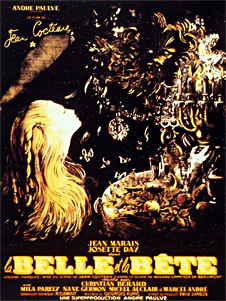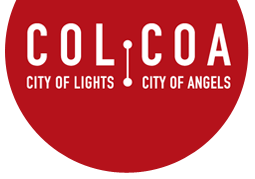BEAUTY AND THE BEAST /
La Belle et la bête (Cocteau’s version)
West Coast Premiere (Restored version) • Fantasy/Drama • France, 1946
DCP • 1:37 • Mono • B&W• 96 min
Directed by: Jean Cocteau
Written by: Jean Cocteau, based on the book by Jeanne-Marie Leprince de Beaumont
Cinematography: Henri Alekan
Film Editing: Claude Iberia
Original Score: Georges Auric
Produced by: André Paulvé (Discina)
Cast: Josette Day (Belle), Jean Marais (The Beast), Mila Parély (Félicie)
International Sales: SND Group M6
U.S. Distributor: Janus Films
For modern audiences, the shimmering black and white of Jean Cocteau’s masterwork might obscure its visual opulence, much the same way as the animal features of the Beast obscure his inner humanity. Look beyond that, because this stylish, adult rendition of the famous 18th century fairytale is one of the highlights of French postwar cinema. Unlike the break to neorealism that marked the postwar films of Italy, France tended to continue in the styles established in the Vichy years. But like all Cocteau films, this is foremost a personal exploration, a poetic total immersion into allegory and symbolism. Nevertheless, the surreal yet realistic sets, Jean Marais’s convincing prosthetic make-up – which took five hours to apply – the Vermeer-like framing by legendary cinematographer Henri Alekan, all of these were remarkable achievements given the limited means at Cocteau’s disposal. Don’t miss this fully restored big-screen presentation of the film Empire magazine ranks 26th among the 100 Best Films of World Cinema.
Beauty and the Beast marked Cocteau's return to filmmaking fifteen years after his dreamlike The Blood of a Poet rocked the French establishment, but he was far from idle during that period. In fact, latter-day hyphenates are beggared by Cocteau’s success as poet, novelist, dramatist, designer, painter, playwright, and filmmaker. In the wake of the Belle Époque, Cocteau became a key figure of the avant-garde, collaborating with the likes of Picasso, Diaghilev, Luis Buñuel, Édith Piaf, Erik Satie, and Igor Stravinsky. Cocteau regarded film as an “admirable vessel for poetry” substituting light for the poet’s ink. He shared some of the surrealists’ preoccupation with what Dali called “making the unreal more real than true reality”, and this approach was especially evident in his films.
“It is a fabric of gorgeous visual metaphors, of undulating movements and rhythmic pace, of hypnotic sounds and music…”
- Bosley Crowther NEW YORK TIMES
“Today's artificial CGI-produced gimmicks have nothing on this film's wondrous visual imagery.”
- Jeff Vice, DESERET NEWS
“Jean Cocteau has brought to life a visual masterpiece.”
- Damian Cannon MOVIE REVIEWS UK







